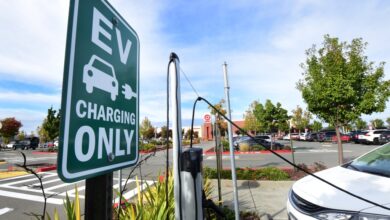Israel does not promote electric vehicle transition, causing suffocation

Air pollution from vehicles costs us NIS 7.2 billionin health damage and quality of life, but Israel fails to promote actions that could change the situation: increasing the use of eco-friendly public transport rapidly, encouraging cycling, and transitioning to electric vehicles.
According to the State Comptroller, air pollution attributed to transportation accounts for 15% of total pollution from particles, a relatively high figure compared to Europe. A significant portion of it comes from trucks and buses. However, the country does not promote the scrapping of old and polluting trucks, and does not impose a purchase tax on new and polluting trucks, which could encourage fleets to switch to electric trucks or incentivize them financially.
Since 2003, the Ministry of Environmental Protection and the Ministry of Transportation have not conducted an economic feasibility assessment for scrapping heavy vehicles, the plan to scrap private cars has been halted, and the Ministry of Environmental Protection does not have a clear policy or long-term plan to declare low-emission zones, where entry of old diesel vehicles is prohibited. Meanwhile, there has been a decrease in the number of inspections by the Ministry of Environmental Protection in vehicle licensing facilities and bus depots. When inspections are carried out, the rate of vehicles rejected by the enforcement unit during road inspections in 2021 was about 15%, while the rejection rate at the licensing office during the annual licensing test stood at only about 3.3% in 2021, indicating a gap in the inspection method.
Those who already purchase an electric car face a shortage in the number of charging stations: The Ministry of Energy and the Ministry of Transportation have not yet agreed on quantitative targets for deploying public charging stations or guidelines for the geographical deployment of public charging stations, and have not defined the types of stations suitable for deployment on intercity roads. This is in contrast to what is done in the field in the European Union and the United States.
And also in residential buildings: The Ministries of Interior and Energy have not yet regulated what is required for establishing car charging stations in shared residential buildings. In the absence of order, disputes may arise among residents and even neighbor conflicts. Such conflicts and the difficulty in reaching agreements could be a real barrier to the widespread entry of electric vehicles into the vehicle fleet in Israel. For example, planning and construction regulations require as of March 2023 that the electrical panel of a new residential building support the charging of 20% of all vehicles in the building. However, if the government’s goals to reduce greenhouse gas emissions from new vehicles are achieved, gradually more than 20% of electric vehicles will be found in shared buildings, and therefore the existing regulations do not align with the government’s goals in this matter.
Regarding enforcement: Despite the determination that guidelines for proper use of charging stations will be presented to the Knesset by 2022, the Ministry of Transportation has not even drafted regulations for enforcement against drivers who park gasoline vehicles in electric vehicle charging stations, or electric vehicle owners who park there without charging and prevent others from doing so.
All of this, when according to the electric company’s work plan, all new vehicles from 2035 will be electric, and 74% of new vehicles in 2030 will be electric. Noga, the company responsible for the spread of the electric infrastructure, assumes that starting from 2035 all new vehicles will be electric, and by 2030 around 70% of new vehicles will be electric. These assumptions do not align with the government’s decision, which stated that by 2030 all light vehicles imported to Israel will have emissions that are 95% lower than those in 2020. The electric system lacks the walking capabilities and the hatred required to increase the charging capacity needed for electric vehicles.
Taxes: The heavy taxation on new cars does not reflect their pollution level, as the State Comptroller refers to the luxury tax that is supposed to be applied in the Dan region as an existing fact, even though Transportation Minister Miri Regev has actually canceled it, without government decisions on the matter. Additionally, because trucks are exempt from purchase tax, they are not obligated to pay tax based on pollution levels like private cars. The Comptroller also expresses support for imposing a mileage tax on electric vehicles, which the Treasury is trying to reintroduce in the current state budget.
The State Comptroller’s Office recommends that the Treasury, Transportation and Energy Ministries, and the Tax Authority provide their input on the government decision from July 2010, which instructed to examine a multi-year plan to focus on the main payment responsibilities with fluctuating costs. When considering changes in purchase tax rates on electric vehicles and examining the taxation on vehicles that would address the external impacts of electric vehicles (especially regarding road congestion, air pollution damages, road accidents, and additional costs), it is recommended to take into account the benefits of reducing air pollution from transportation. All this is to encourage the entry of electric vehicles into Israel and to meet the government’s set goals.
The Ministry of Transportation and Road Safety sees great importance in the relationship between transportation and the environment and invests significant efforts in reducing greenhouse gas emissions. The Ministry continuously promotes the use of public transportation and sustainable transportation, while accelerating the transition to zero-emission vehicles through green taxation, reducing regulations, easing import requirements for ‘green’ vehicles, and promoting public transportation.
The Ministry states that it takes the remarks of the State Comptroller seriously, many of the issues pointed out in the report have been addressed or are in the process of implementation.
Regarding the treatment of heavy polluting vehicles, it is noted that various steps are being taken within the framework of an advanced freight plan to shift cargo transport from trucks to trains. There is a gradual transition planned to use electric carts instead of diesel carts and the establishment of hubs at metropolitan entrances, where cargo will be transferred from heavy and polluting trucks so they do not enter city centers.
Regarding the program to reduce pollution from old private vehicles, the subject is budget-dependent and a budget for this issue was not approved in the budget summary. The subject will be reconsidered in collaboration with the Ministry of Environmental Protection in the next budget summary.
Regarding monitoring and managing an information database on enforcement actions against air pollution, the Ministry of Transportation has a database of air pollution test results conducted as part of the annual test according to the identification chart. In case data from surprise tests on roads conducted by the Ministry of Environmental Protection is transferred, the Ministry can make comparisons based on the auditor’s recommendations.
From the Ministry of Environmental Protection it was stated: The report deals with a fundamental and important issue in the transportation sector and its impact on air pollution and greenhouse gas emissions affecting the general public. The Ministry of Environmental Protection has been working for many years to reduce air pollution resulting from road transportation through all the means at its disposal, including promoting clean and electric transportation in Israel.
The Ministry of Environmental Protection carries out many enforcement actions on Israeli roads, in collaboration with the Israeli police, in addition to inspections at licensing centers and bus stations, in order to preserve clean air and prevent air pollution from transportation. The ministry will continue to work to promote and enhance focused enforcement actions, in collaboration with relevant authorities.
In recent years, the ministry, in collaboration with the Ministry of Energy and Infrastructure and the Ministry of Transportation, has promoted the adoption of the mechanism to reduce greenhouse gas emissions practiced in Europe and the United States, requiring importers to meet emission targets upon importing new vehicles. The ministry believes this is a complementary step to incentivize reduced taxation of electric vehicles to ensure the entry of electric vehicles and reduce emissions of air pollutants and noise from road transportation.



